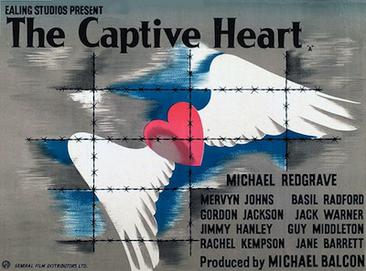“The Captive Heart” is supposedly the first WWII prisoner of war movie. This means it started a venerable subgenre. It is a British film that was directed by Basil Dearden (“Khartoum”). It was released in the U.S. under the terrible title of “Captive Camp 23” which I would assume consigned it to drive-in movie theaters. It was a hit in Great Britain. Not in the U.S. The movie stars Michael Redgrave and Rachel Kempson who were married from 1935 until Redgrave’s death in 1985. The movie was filmed partly at the Marlag und Milag Nord prison camp. One of the co-writers was a prisoner there during the war. Some of the actors in the movie had been POWs, including Derek Bond and Sam Kydd. The production had the cooperation of the British Army of the Rhine, which provided soldiers for the camp scenes.
The movie claims that it is “based on fact, but fictional characters”. A narrator proclaims that the movie is dedicated to prisoners of war. It opens in France in 1940. British prisoners are being marched to prison camps. One of them is Capt. Geoffrey Mitchell (Redgrave) who is actually a Czech escapee named Hasek from Dachau concentration camp. He has assumed the identity of the dead Mitchell. The prisoners march into the prison camp whistling and with their upper lips stiff, naturally. Things get sticky when a Gestapo agent arrives who might remember Hasek. While the suspense is brewing, the movie intercuts back to England to delve into the soap operaish relationships of some of the men. There is a love quadrangle to entertain the ladies in the audience. And of course, the POW camp as summer camp to entertain the men. Hasek is corresponding with Celia Mitchell (Rachel Kempson) as part of his cover. Celia wonders why her loutish husband is suddenly the sensitive type. Nazis make good marriage counselors, apparently.
“The Captive Heart” is middle of the road POW subgenre. It is well acted by a good cast, which cushions some of the predictability. The thing that stands out is the balancing of the men and their women. This tends to be melodramatic, but it is an area that most POW movies do not dwell on. Some of it is silly, as with most soap opera plots. The main relationship, which is the one between Hasek and Celia, strains credulity, but it is the other arc to go along with the suspense of whether Hasek will be discovered by the stereotypical Gestapo agent. This is about the only suspense in the camp as it is one of those POW movies that makes the camp seem to be a fun vacation from the war. The men play cricket and garden as a pastimes and tunnel as a hobby. The humor is very British and so is the dialogue. One of the prisoners says “Bob is your uncle”.
Despite the schmaltzy romance and the coincidences and implausibilities, “The Captive Heart” is an entertaining trifle. Its attempt to contrast the home front with the camp is commendable. It would have been more realistic to show the men worse off than the women, but what the Hell.
GRADE = B

.jpg)
